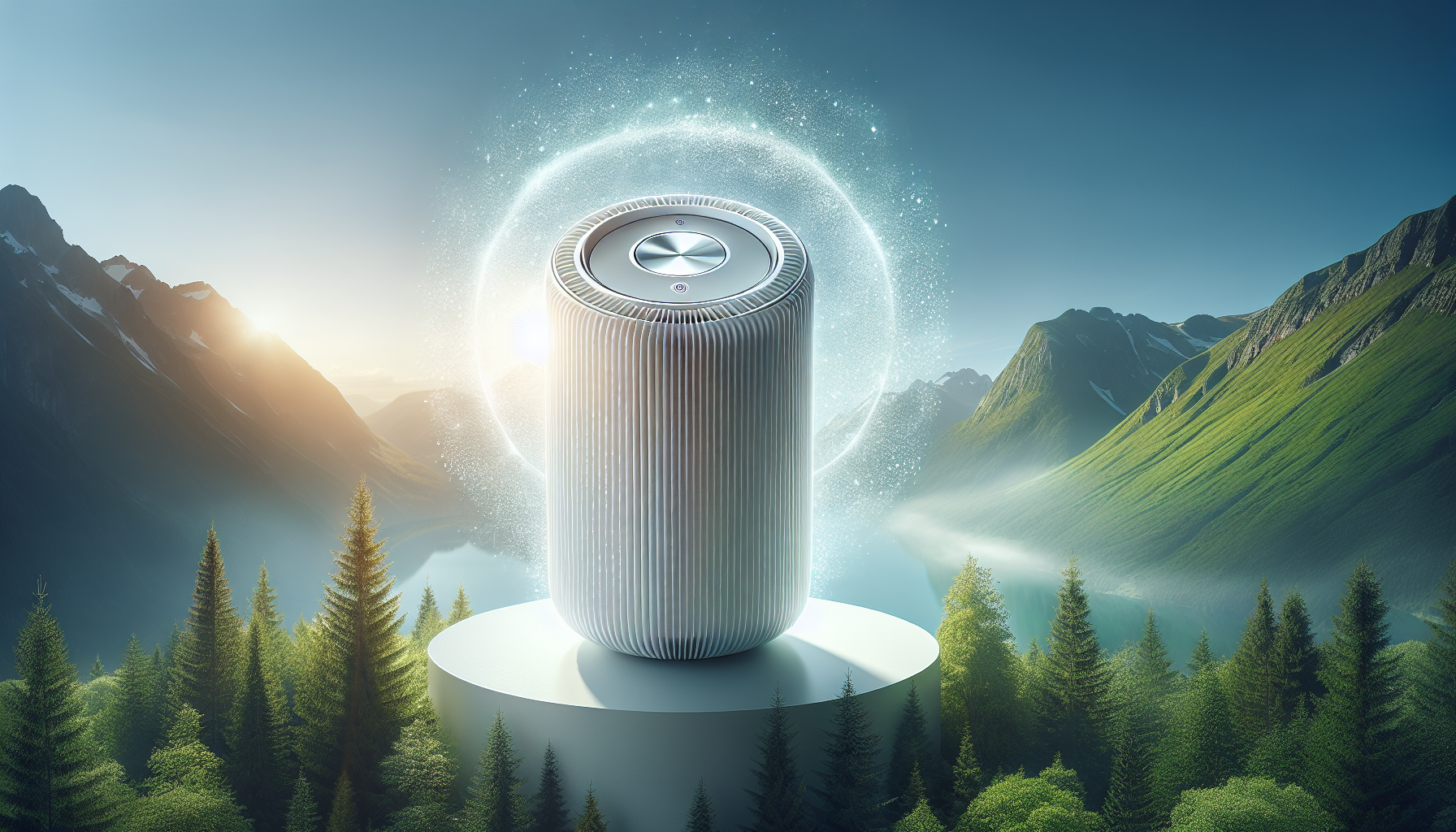Are Personal Air Purifiers Worth It? Discover the answer to this burning question that is on the minds of many individuals concerned about the quality of the air they breathe. With growing concerns about pollution and allergens, personal air purifiers have become an increasingly popular solution. In this article, you will explore the benefits and drawbacks of personal air purifiers, and gain insights into whether investing in one is truly worthwhile for improving your overall air quality. So, let’s dive in and find out if these nifty gadgets are worth your time and money!

Benefits of Personal Air Purifiers
Improving Indoor Air Quality
Personal air purifiers are highly effective in improving the quality of indoor air. By removing harmful pollutants and allergens, these devices create a clean and healthy environment for you and your family. Indoor air quality is often worse than outdoor air due to the accumulation of pollutants like dust, pet dander, and volatile organic compounds (VOCs). A personal air purifier can help eliminate these contaminants, providing you with fresher and cleaner air to breathe.
Reducing Allergens and Irritants
For individuals who suffer from allergies or respiratory conditions such as asthma, personal air purifiers can be a game-changer. These devices trap and filter out common allergens such as pollen, mold spores, and dust mites, reducing the risk of allergic reactions and respiratory issues. By creating a safe haven from allergens and irritants, personal air purifiers can significantly improve your overall well-being and quality of life.
Eliminating Odors and VOCs
Personal air purifiers not only remove visible particles but also target odors and volatile organic compounds (VOCs). Everyday activities like cooking, cleaning, and using certain household products release odorous substances and chemicals into the air. By using activated carbon filters, personal air purifiers absorb these unpleasant smells and harmful VOCs, leaving your space smelling fresh and clean.
Enhancing Respiratory Health
Breathing clean air is essential for good respiratory health. Personal air purifiers can help reduce the risk of respiratory disturbances by removing airborne particles that can trigger asthma attacks or worsen other respiratory conditions. By decreasing the number of airborne pollutants you inhale, these devices promote better lung function, allowing you to enjoy improved respiratory health and a higher quality of life.
Factors to Consider Before Buying
Room Size and Coverage Area
Before purchasing a personal air purifier, it’s essential to consider the size of the room or area you want to purify. Different air purifiers have different coverage area capacities, and selecting the right one for your space is crucial to its effectiveness. Measure the square footage of the room and refer to the manufacturer’s recommendations to ensure you choose a purifier that can adequately clean the air in that specific area.
Filtration System
The filtration system is the heart of a personal air purifier. It determines the efficiency with which the device removes particles from the air. Look for purifiers that utilize high-quality HEPA (High-Efficiency Particulate Air) filters, as these are proven to be highly effective in capturing airborne particles as small as 0.3 microns. Additionally, consider purifiers that include activated carbon filters to eliminate odors and VOCs.
Noise Level
Some personal air purifiers can generate noise, which may be a concern, especially if you plan to use the device in a bedroom or other quiet spaces. Look for purifiers that offer a low noise level or adjustable fan speeds to suit your preferences and ensure a peaceful environment.
Maintenance and Filter Replacement
Regular maintenance and filter replacement are necessary to keep your personal air purifier working effectively. Check the manufacturer’s recommendations for the frequency of filter replacement and ensure that filters are easily accessible and reasonably priced. Some purifiers even come with filter replacement indicators to make the maintenance process more convenient.
Cost and Energy Consumption
Consider the cost of the personal air purifier upfront as well as its long-term maintenance costs. Additionally, pay attention to the device’s energy consumption, as some models may consume more electricity than others. Look for energy-efficient purifiers that carry the ENERGY STAR label, as these devices are designed to operate efficiently and save on energy costs.
Effectiveness of Personal Air Purifiers
Understanding CADR and ACH
When evaluating the effectiveness of personal air purifiers, two important metrics to consider are the Clean Air Delivery Rate (CADR) and the Air Changes per Hour (ACH). CADR measures the speed at which the purifier can remove specific particles, such as dust, pollen, and smoke, from the air. Higher CADR values indicate faster and more efficient purification. ACH measures how many times the purifier can completely exchange the air in a room in an hour. Aim for a higher ACH to ensure optimal air purification.
Comparing Different Types of Filters
There are different types of filters used in personal air purifiers, each with its own advantages and specifications. HEPA filters are particularly effective in capturing fine particles, while activated carbon filters excel at eliminating odors and VOCs. Some purifiers also utilize electrostatic or ionizing filters, which charge particles to attract them to a collection plate. Consider your specific needs to determine which type of filter would be most suitable for you.
Testing and Certification Standards
When selecting a personal air purifier, it’s important to choose a device that has been tested and certified for its performance. Look for certifications such as those from the Association of Home Appliance Manufacturers (AHAM) or the California Air Resources Board (CARB). These certifications confirm that the purifier meets specific standards for safety, efficiency, and effectiveness.
Real-life User Experiences
One of the best ways to gauge the effectiveness of a personal air purifier is to consider real-life user experiences. Read reviews and testimonials from other customers to get insights into how well the purifier works in various scenarios. Pay attention to reviews from customers who have similar needs or conditions as you to get a better idea of how the device would perform in your specific circumstances.
Situation-Specific Considerations
Allergies and Asthma
If you or someone in your household suffers from allergies or asthma, personal air purifiers can significantly improve quality of life. Look for purifiers with HEPA filters as they effectively capture airborne allergens such as pollen, dust mites, and pet dander. High CADR and ACH values are especially important for those with respiratory conditions, as they ensure a higher turnover of purified air.
Pets and Pet Allergens
Pet owners often struggle with allergies caused by pet dander and hair. Personal air purifiers can be a great solution in these situations. Look for purifiers specifically designed to capture pet allergens and consider models with activated carbon filters to neutralize lingering pet odors.
Smoking and Secondhand Smoke
If you or someone in your household smokes or you have guests who smoke indoors, personal air purifiers can help remove smoke particles and reduce the presence of secondhand smoke. Opt for purifiers with high CADR values for smoke and consider models with both HEPA and activated carbon filters to effectively eliminate smoke odors.
Outdoor Air Pollution
For those living in areas with high levels of outdoor air pollution, personal air purifiers can provide relief and improve indoor air quality. Look for purifiers with highly efficient filters, such as HEPA filters, to capture fine particles commonly found in polluted outdoor air. Additionally, purifiers with activated carbon filters can help remove harmful VOCs that may seep indoors.
Dust and Dust Mites
Maintaining a dust-free environment can be a challenge, especially for individuals with dust allergies. Personal air purifiers equipped with effective HEPA filters can drastically reduce the presence of dust particles and dust mites in your home. Look for purifiers that have high CADR values for dust and consider models with washable pre-filters to further enhance their efficiency.

Alternatives to Personal Air Purifiers
Natural Ventilation and Open Windows
One alternative to using a personal air purifier is to rely on natural ventilation. Opening windows and letting fresh air circulate can help remove indoor pollutants and refresh the air naturally. However, this option may not be suitable in all situations, such as during extreme weather conditions or in areas with high outdoor air pollution.
Regular Cleaning and Dusting
Maintaining a clean and dust-free home is crucial to improving indoor air quality. Regular cleaning and dusting can help reduce the presence of allergens, dust, and other airborne particles. Vacuuming carpets, dusting surfaces, and washing bedding and curtains can all contribute to a cleaner living space.
Proper Indoor Air Circulation
Improving indoor air circulation is another effective way to enhance air quality. Use fans or air circulation devices to ensure that air flows freely throughout your home. This helps prevent stagnant air and encourages the removal of pollutants and allergens.
Houseplants for Air Purification
Certain houseplants have the natural ability to purify the air by absorbing toxins and volatile compounds. Adding indoor plants such as spider plants, peace lilies, or snake plants can contribute to cleaner air and a healthier living environment. However, it’s important to note that plants alone may not be sufficient to effectively remove all pollutants.
HVAC Systems and Air Filters
If you have a central heating, ventilation, and air conditioning (HVAC) system in your home, consider upgrading it with high-quality air filters. HEPA filters designed for HVAC systems can effectively remove airborne particles and improve overall indoor air quality. This option is particularly beneficial for those looking to purify the air throughout their entire home.
Choosing the Right Personal Air Purifier
Identifying Specific Needs
Before selecting a personal air purifier, it’s important to identify your specific needs. Consider factors such as room size, the presence of pets or smokers, outdoor air pollution levels, and any pre-existing respiratory conditions. Understanding your unique requirements will help you choose a purifier that best meets your needs.
Researching Product Reviews and Ratings
Researching product reviews and ratings is an essential step in choosing the right personal air purifier. Reading reviews from reputable sources and customer testimonials can provide valuable insights into the performance, reliability, and effectiveness of different models. Look for consistently positive reviews and pay attention to any potential drawbacks mentioned by users.
Considering Brand Reputation
Brand reputation plays a significant role when investing in a personal air purifier. Established brands with a history of producing reliable and durable products are often a safe choice. Do some research on the brand’s reputation, customer satisfaction levels, and after-sales service before making your final decision.
Comparing Features and Specifications
Compare the features and specifications of different models to find the one that best suits your needs. Pay close attention to factors such as filtration system type, CADR, ACH, noise levels, and additional features like filter replacement indicators or smart capabilities. Consider which features are most important to you to make an informed decision.
Testing the Unit’s Noise Level
To ensure that the personal air purifier is suitable for your desired location, consider testing its noise level. Visit a store or look for video reviews that demonstrate the device’s operation to get a sense of its noise output. This will help you determine whether the purifier’s noise level is acceptable for the intended use.
Tips for Optimizing Air Purifier Performance
Proper Placement and Airflow
To maximize the performance of your personal air purifier, proper placement and airflow are crucial. Place the purifier in an area where it can effectively capture and filter the air. Avoid obstructing the device with furniture or other objects to ensure optimal airflow and circulation.
Regular Cleaning and Maintenance
Keeping your personal air purifier clean is essential for its efficiency and longevity. Follow the manufacturer’s instructions for regular cleaning and maintenance, including wiping down the exterior, cleaning the filters, and emptying any water or waste collection containers. Regular maintenance will ensure that your purifier continues to work effectively over time.
Changing Filters as Recommended
Filter replacement is a critical aspect of maintaining the effectiveness of your personal air purifier. Follow the manufacturer’s recommendations for filter replacement frequency and be diligent about changing filters as instructed. Neglecting filter replacement can compromise the purifier’s performance and potentially reduce its lifespan.
Avoiding Obstructions and Blockages
Ensure that the air intake and outlet of your personal air purifier are free from obstructions and blockages. Dust, dirt, or debris can accumulate around these areas, hindering the flow of air and impacting the purifier’s performance. Regularly check and clean these openings to allow for unobstructed airflow.
Monitoring Indoor Air Quality
While personal air purifiers are designed to improve indoor air quality, it’s still important to monitor the air quality in your surroundings. Consider investing in an air quality monitor or using smartphone apps that provide real-time updates on air quality. This will give you a better understanding of the effectiveness of your purifier and allow you to take necessary action if required.
Conclusion
Weighing the pros and cons of personal air purifiers is crucial before making a final decision. The benefits of improved indoor air quality, reduced allergens and irritants, and enhanced respiratory health cannot be overstated. However, personal air purifiers may not be suitable for everyone, and alternative methods of improving indoor air quality should also be considered.
When considering whether a personal air purifier is worth it for you, take into account individual circumstances such as allergies, pets, smoking habits, or exposure to outdoor air pollution. Review the specific factors to consider before buying, the effectiveness of personal air purifiers, and situation-specific considerations mentioned in this article. Additionally, follow the tips for optimizing air purifier performance.
Ultimately, the decision to invest in a personal air purifier is a personal one. Assess your needs, research different models, and choose a purifier that aligns with your requirements and budget. By making an informed decision, you can create a healthier and more comfortable living environment for yourself and your loved ones.

